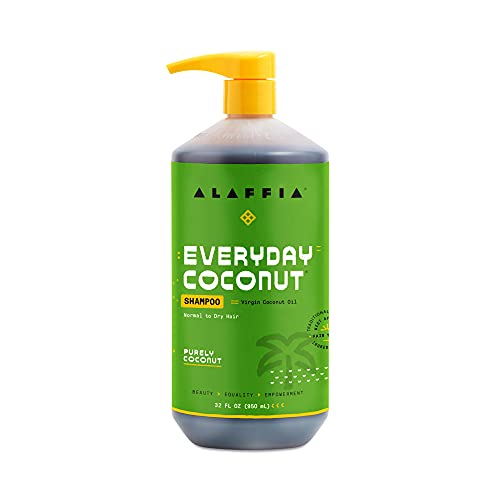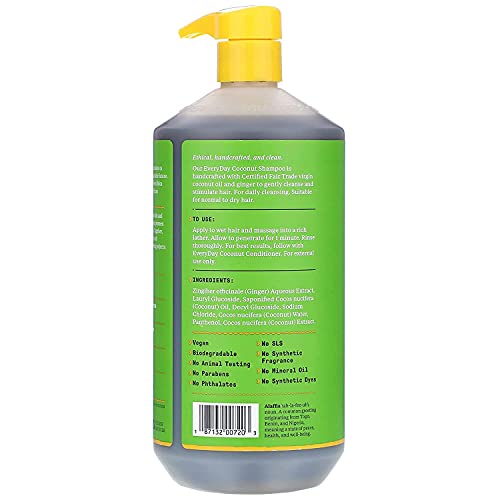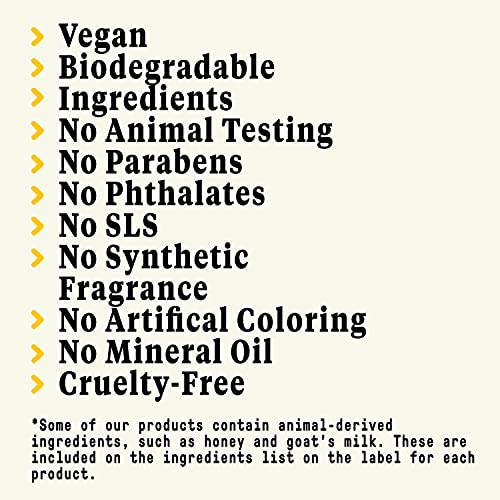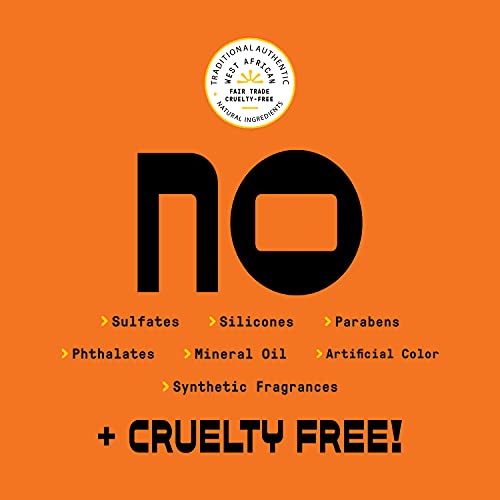




Alaffia Everyday Coconut Shampoo - Hydrates & Cleanses with Fair Trade Coconut Oil - 32 Fl Oz


Zingiber Officinale (Ginger) Extract
Low RiskZingiber officinale (ginger) extract is derived from the rhizome of the ginger plant. It is commonly used in various products for its aromatic properties and potential health benefits, including anti-inflammatory and antioxidant effects.
Sustai Insights
Ginger extract offers functional benefits such as flavor enhancement and potential anti-inflammatory effects. It is considered low risk regarding health concerns like carcinogenicity, allergies, and reproductive toxicity. Environmentally, it poses minimal risks and is not bioaccumulative. Regulatory status is favorable, with no current restrictions. Safe usage practices recommend moderation to avoid possible irritation. Overall, the risk level associated with ginger extract is low, and it serves as a viable ingredient in formulations.
Hydrogenated Coconut Oil
Low RiskHydrogenated coconut oil is an end product of the hydrogenation process, where coconut oil is chemically altered to enhance its stability and shelf-life. It serves primarily as an emollient and thickening agent in cosmetic formulations, providing a smooth texture and moisturizing properties.
Sustai Insights
Hydrogenated coconut oil offers functional benefits as a moisturizing agent and stabilizer in formulations. It is generally recognized as safe with low risks for cancer, allergies, and reproductive toxicity, according to the Cosmetic Ingredient Review (CIR). Environmental impacts are minimal, with no significant pollutant potential. Regulatory bodies have not issued advisories against its use. Overall, the ingredient presents a low risk profile, making it a suitable choice in cosmetic products. For those seeking alternatives, natural oils or non-hydrogenated variants may be considered.
Hydrogenated Coconut Oil
Low RiskHydrogenated coconut oil is an end product of the hydrogenation process, where coconut oil is chemically altered to enhance its stability and shelf-life. It serves primarily as an emollient and thickening agent in cosmetic formulations, providing a smooth texture and moisturizing properties.
Sustai Insights
Hydrogenated coconut oil offers functional benefits as a moisturizing agent and stabilizer in formulations. It is generally recognized as safe with low risks for cancer, allergies, and reproductive toxicity, according to the Cosmetic Ingredient Review (CIR). Environmental impacts are minimal, with no significant pollutant potential. Regulatory bodies have not issued advisories against its use. Overall, the ingredient presents a low risk profile, making it a suitable choice in cosmetic products. For those seeking alternatives, natural oils or non-hydrogenated variants may be considered.
Hydrogenated Coconut Oil
Low RiskHydrogenated coconut oil is an end product of the hydrogenation process, where coconut oil is chemically altered to enhance its stability and shelf-life. It serves primarily as an emollient and thickening agent in cosmetic formulations, providing a smooth texture and moisturizing properties.
Sustai Insights
Hydrogenated coconut oil offers functional benefits as a moisturizing agent and stabilizer in formulations. It is generally recognized as safe with low risks for cancer, allergies, and reproductive toxicity, according to the Cosmetic Ingredient Review (CIR). Environmental impacts are minimal, with no significant pollutant potential. Regulatory bodies have not issued advisories against its use. Overall, the ingredient presents a low risk profile, making it a suitable choice in cosmetic products. For those seeking alternatives, natural oils or non-hydrogenated variants may be considered.
Cocos Nucifera Fruit Extract
Low RiskCocos Nucifera Fruit Extract is an extract derived from the fruit of the coconut palm, commonly used in cosmetic formulations for its moisturizing properties. It serves primarily as a skin conditioning agent, contributing to product texture and hydration.
Sustai Insights
Cocos Nucifera Fruit Extract offers functional benefits such as effective skin hydration and conditioning, with sustainable sourcing potential. Scientific assessments indicate low health risks, including minimal concerns for carcinogenicity, allergies, and reproductive toxicity. Environmental impacts are also low, with no significant bioaccumulation or pollution concerns. Regulatory bodies do not impose restrictions on its use, leading to an overall low-risk classification. Safe usage practices include patch testing for sensitive individuals. Alternatives like shea butter or other plant-based extracts may be considered for similar benefits.
Lauryl Glucoside
Low RiskLauryl glucoside is a sugar- and lipid-based surfactant commonly used in personal care products. It functions as a mild cleanser and emulsifier, helping to solubilize oils and dirt while contributing to product texture and stability.
Sustai Insights
Lauryl glucoside offers functional benefits as a gentle surfactant that effectively cleanses without harshness, and it is biodegradable, indicating sustainable sourcing. Health risks are minimal, with low concerns for carcinogenicity and low to moderate potential for irritation or allergies. Environmental risks are also low, with no significant pollutant or bioaccumulation concerns. Regulatory bodies have not issued specific warnings. Overall, it is assessed as low risk, suitable for use in various formulations, making it a viable option for those seeking safer alternatives.
Cocos Nucifera (Coconut) Water
Low RiskCocos Nucifera (coconut) water is an aqueous extract derived from the fruit of the coconut palm. It is commonly used in cosmetic and personal care products for its hydrating and soothing properties. Coconut water is rich in electrolytes and nutrients, making it a popular ingredient in formulations aimed at hydration.
Sustai Insights
Coconut water provides effective hydration and possesses antioxidant properties, contributing to skin health. It is sustainably sourced and biodegradable, enhancing its environmental profile. Health risks are minimal, with low concerns for carcinogenicity, allergies, or reproductive toxicity. Regulatory bodies do not impose significant restrictions on its use, marking it as a low-risk ingredient. Safe usage practices recommend using it in formulations designed for topical application, with alternatives including aloe vera for similar hydration benefits.
Decyl Glucoside
Low RiskDecyl glucoside is a glucose-based surfactant derived from natural sources, primarily used as a mild cleansing agent in personal care products. It effectively reduces surface tension, allowing for improved mixing of ingredients and enhanced cleansing properties without stripping natural oils from the skin.
Sustai Insights
Decyl glucoside offers functional benefits as a non-ionic surfactant, making it suitable for sensitive skin formulations. It is biodegradable and derived from renewable resources, supporting sustainability. Health risks are primarily low, with minimal concerns regarding irritation and allergies. Environmental risks are low, as it does not significantly contribute to pollution or bioaccumulation. Regulatory status is generally favorable, with low restrictions noted. Overall, decyl glucoside presents a low risk for use in consumer products, making it a suitable choice for gentle formulations.
Panthenol
Low RiskPanthenol, a derivative of vitamin B5, is commonly used in cosmetic formulations for its moisturizing and skin-conditioning properties. It acts as a humectant, helping to retain moisture in the skin and hair, thereby improving hydration and texture.
Sustai Insights
Panthenol offers functional benefits such as effective hydration and skin conditioning, making it valuable in various cosmetic products. It is considered low risk regarding health impacts, with minimal concerns about carcinogenicity, allergies, or reproductive toxicity. Environmental risks are also low, with no significant pollutant or bioaccumulation potential. Regulatory bodies have not imposed restrictions on its use. Safe usage practices include adhering to recommended concentrations. Alternatives like glycerin may provide similar moisturizing benefits, but overall, panthenol is assessed as a low-risk ingredient.
Sodium Chloride
Low RiskSodium chloride is an inorganic salt commonly known as table salt. It is primarily used in food preservation and flavor enhancement, as well as in various industrial applications. It exists as a crystalline solid and dissolves easily in water, making it effective for diverse uses in food products and other formulations.
Sustai Insights
Sodium chloride serves essential functions in food preservation and flavor enhancement. It is considered safe with low health risks related to cancer, allergies, and reproductive toxicity. Environmental concerns are minimal, as it does not bioaccumulate and poses low pollutant potential. Regulatory bodies, including the FDA, recognize its safety for consumption. Overall, sodium chloride carries a low risk profile, making it a widely accepted ingredient in food and cosmetic products.
Zingiber Officinale (Ginger) Extract
Low RiskZingiber officinale (ginger) extract is derived from the rhizome of the ginger plant. It is commonly used in various products for its aromatic properties and potential health benefits, including anti-inflammatory and antioxidant effects.
Sustai Insights
Ginger extract offers functional benefits such as flavor enhancement and potential anti-inflammatory effects. It is considered low risk regarding health concerns like carcinogenicity, allergies, and reproductive toxicity. Environmentally, it poses minimal risks and is not bioaccumulative. Regulatory status is favorable, with no current restrictions. Safe usage practices recommend moderation to avoid possible irritation. Overall, the risk level associated with ginger extract is low, and it serves as a viable ingredient in formulations.
Hydrogenated Coconut Oil
Low RiskHydrogenated coconut oil is an end product of the hydrogenation process, where coconut oil is chemically altered to enhance its stability and shelf-life. It serves primarily as an emollient and thickening agent in cosmetic formulations, providing a smooth texture and moisturizing properties.
Sustai Insights
Hydrogenated coconut oil offers functional benefits as a moisturizing agent and stabilizer in formulations. It is generally recognized as safe with low risks for cancer, allergies, and reproductive toxicity, according to the Cosmetic Ingredient Review (CIR). Environmental impacts are minimal, with no significant pollutant potential. Regulatory bodies have not issued advisories against its use. Overall, the ingredient presents a low risk profile, making it a suitable choice in cosmetic products. For those seeking alternatives, natural oils or non-hydrogenated variants may be considered.
Hydrogenated Coconut Oil
Low RiskHydrogenated coconut oil is an end product of the hydrogenation process, where coconut oil is chemically altered to enhance its stability and shelf-life. It serves primarily as an emollient and thickening agent in cosmetic formulations, providing a smooth texture and moisturizing properties.
Sustai Insights
Hydrogenated coconut oil offers functional benefits as a moisturizing agent and stabilizer in formulations. It is generally recognized as safe with low risks for cancer, allergies, and reproductive toxicity, according to the Cosmetic Ingredient Review (CIR). Environmental impacts are minimal, with no significant pollutant potential. Regulatory bodies have not issued advisories against its use. Overall, the ingredient presents a low risk profile, making it a suitable choice in cosmetic products. For those seeking alternatives, natural oils or non-hydrogenated variants may be considered.
Hydrogenated Coconut Oil
Low RiskHydrogenated coconut oil is an end product of the hydrogenation process, where coconut oil is chemically altered to enhance its stability and shelf-life. It serves primarily as an emollient and thickening agent in cosmetic formulations, providing a smooth texture and moisturizing properties.
Sustai Insights
Hydrogenated coconut oil offers functional benefits as a moisturizing agent and stabilizer in formulations. It is generally recognized as safe with low risks for cancer, allergies, and reproductive toxicity, according to the Cosmetic Ingredient Review (CIR). Environmental impacts are minimal, with no significant pollutant potential. Regulatory bodies have not issued advisories against its use. Overall, the ingredient presents a low risk profile, making it a suitable choice in cosmetic products. For those seeking alternatives, natural oils or non-hydrogenated variants may be considered.
Cocos Nucifera Fruit Extract
Low RiskCocos Nucifera Fruit Extract is an extract derived from the fruit of the coconut palm, commonly used in cosmetic formulations for its moisturizing properties. It serves primarily as a skin conditioning agent, contributing to product texture and hydration.
Sustai Insights
Cocos Nucifera Fruit Extract offers functional benefits such as effective skin hydration and conditioning, with sustainable sourcing potential. Scientific assessments indicate low health risks, including minimal concerns for carcinogenicity, allergies, and reproductive toxicity. Environmental impacts are also low, with no significant bioaccumulation or pollution concerns. Regulatory bodies do not impose restrictions on its use, leading to an overall low-risk classification. Safe usage practices include patch testing for sensitive individuals. Alternatives like shea butter or other plant-based extracts may be considered for similar benefits.
Lauryl Glucoside
Low RiskLauryl glucoside is a sugar- and lipid-based surfactant commonly used in personal care products. It functions as a mild cleanser and emulsifier, helping to solubilize oils and dirt while contributing to product texture and stability.
Sustai Insights
Lauryl glucoside offers functional benefits as a gentle surfactant that effectively cleanses without harshness, and it is biodegradable, indicating sustainable sourcing. Health risks are minimal, with low concerns for carcinogenicity and low to moderate potential for irritation or allergies. Environmental risks are also low, with no significant pollutant or bioaccumulation concerns. Regulatory bodies have not issued specific warnings. Overall, it is assessed as low risk, suitable for use in various formulations, making it a viable option for those seeking safer alternatives.
Cocos Nucifera (Coconut) Water
Low RiskCocos Nucifera (coconut) water is an aqueous extract derived from the fruit of the coconut palm. It is commonly used in cosmetic and personal care products for its hydrating and soothing properties. Coconut water is rich in electrolytes and nutrients, making it a popular ingredient in formulations aimed at hydration.
Sustai Insights
Coconut water provides effective hydration and possesses antioxidant properties, contributing to skin health. It is sustainably sourced and biodegradable, enhancing its environmental profile. Health risks are minimal, with low concerns for carcinogenicity, allergies, or reproductive toxicity. Regulatory bodies do not impose significant restrictions on its use, marking it as a low-risk ingredient. Safe usage practices recommend using it in formulations designed for topical application, with alternatives including aloe vera for similar hydration benefits.
Decyl Glucoside
Low RiskDecyl glucoside is a glucose-based surfactant derived from natural sources, primarily used as a mild cleansing agent in personal care products. It effectively reduces surface tension, allowing for improved mixing of ingredients and enhanced cleansing properties without stripping natural oils from the skin.
Sustai Insights
Decyl glucoside offers functional benefits as a non-ionic surfactant, making it suitable for sensitive skin formulations. It is biodegradable and derived from renewable resources, supporting sustainability. Health risks are primarily low, with minimal concerns regarding irritation and allergies. Environmental risks are low, as it does not significantly contribute to pollution or bioaccumulation. Regulatory status is generally favorable, with low restrictions noted. Overall, decyl glucoside presents a low risk for use in consumer products, making it a suitable choice for gentle formulations.
Panthenol
Low RiskPanthenol, a derivative of vitamin B5, is commonly used in cosmetic formulations for its moisturizing and skin-conditioning properties. It acts as a humectant, helping to retain moisture in the skin and hair, thereby improving hydration and texture.
Sustai Insights
Panthenol offers functional benefits such as effective hydration and skin conditioning, making it valuable in various cosmetic products. It is considered low risk regarding health impacts, with minimal concerns about carcinogenicity, allergies, or reproductive toxicity. Environmental risks are also low, with no significant pollutant or bioaccumulation potential. Regulatory bodies have not imposed restrictions on its use. Safe usage practices include adhering to recommended concentrations. Alternatives like glycerin may provide similar moisturizing benefits, but overall, panthenol is assessed as a low-risk ingredient.
Sodium Chloride
Low RiskSodium chloride is an inorganic salt commonly known as table salt. It is primarily used in food preservation and flavor enhancement, as well as in various industrial applications. It exists as a crystalline solid and dissolves easily in water, making it effective for diverse uses in food products and other formulations.
Sustai Insights
Sodium chloride serves essential functions in food preservation and flavor enhancement. It is considered safe with low health risks related to cancer, allergies, and reproductive toxicity. Environmental concerns are minimal, as it does not bioaccumulate and poses low pollutant potential. Regulatory bodies, including the FDA, recognize its safety for consumption. Overall, sodium chloride carries a low risk profile, making it a widely accepted ingredient in food and cosmetic products.
Experience the nourishing power of Alaffia EveryDay Coconut Shampoo, crafted from fair-trade virgin coconut oil and invigorating African ginger. This ultra-hydrating shampoo gently cleanses while retaining moisture, making it perfect for everyday use on normal to dry hair.
- Hydrating Formula: This shampoo provides deep hydration and promotes scalp health for vibrant hair.
- Sulfate-Free: Formulated without sulfates, parabens, or artificial fragrances, ensuring a gentle cleanse that respects your hair's natural balance.
- Fair Trade Ingredients: Sourced from women-led cooperatives in Togo, this product supports ethical practices and community empowerment.
- Cruelty-Free: Proudly cruelty-free, this shampoo reflects a commitment to humane and sustainable beauty.
- Versatile Use: Ideal for daily cleansing, simply apply to wet hair, massage into a lather, rinse, and follow with conditioner for best results.
Join Alaffia in promoting environmental sustainability and social equity with every wash.
Subscribe & Save with Sustai
- Best Price Guarantee: Always enjoy the lowest prices on sustainable home essentials.
- No Surprises: We’ll notify you before shipping. No hidden fees, ever.
- You’re in Charge: Change, pause, or cancel your subscription anytime with ease.
- Eco-Friendly Deliveries: Our grouped shipments mean less packaging and lower emissions.
Join us on a sustainable journey. Special offers for a limited time! Prices and promotions may change.
Recommended Products
Experience the nourishing power of Alaffia EveryDay Coconut Shampoo, crafted from fair-trade virgin coconut oil and invigorating African ginger. This ultra-hydrating shampoo gently cleanses while retaining moisture, making it perfect for everyday use on normal to dry hair.
- Hydrating Formula: This shampoo provides deep hydration and promotes scalp health for vibrant hair.
- Sulfate-Free: Formulated without sulfates, parabens, or artificial fragrances, ensuring a gentle cleanse that respects your hair's natural balance.
- Fair Trade Ingredients: Sourced from women-led cooperatives in Togo, this product supports ethical practices and community empowerment.
- Cruelty-Free: Proudly cruelty-free, this shampoo reflects a commitment to humane and sustainable beauty.
- Versatile Use: Ideal for daily cleansing, simply apply to wet hair, massage into a lather, rinse, and follow with conditioner for best results.
Join Alaffia in promoting environmental sustainability and social equity with every wash.

You can have at most 2 Sustainable Steals products in your cart
Customer Reviews
Customers’ View
Customers appreciate the gentle cleansing and hydrating properties of the Alaffia EveryDay Coconut Ultra Hydrating Shampoo, noting that it effectively cleans their hair without stripping natural oils. Many highlight the pleasant scent and the natural ingredients, with one customer mentioning, "it smells natural and even feels natural." Users also find it beneficial for maintaining hair health, reporting increased softness and manageability. While some have mixed feelings about the moisture level, many agree that it is a good choice for daily use, particularly for normal to dry hair. Additionally, the shampoo is valued for its fair-trade ingredients, supporting sustainable practices. Overall, customers find this product aligns well with their eco-conscious and health-focused values.
AI-generated from the text of customer reviewsThis product is rated 4.8 of 5.0 stars.
It has received 6 reviews.




